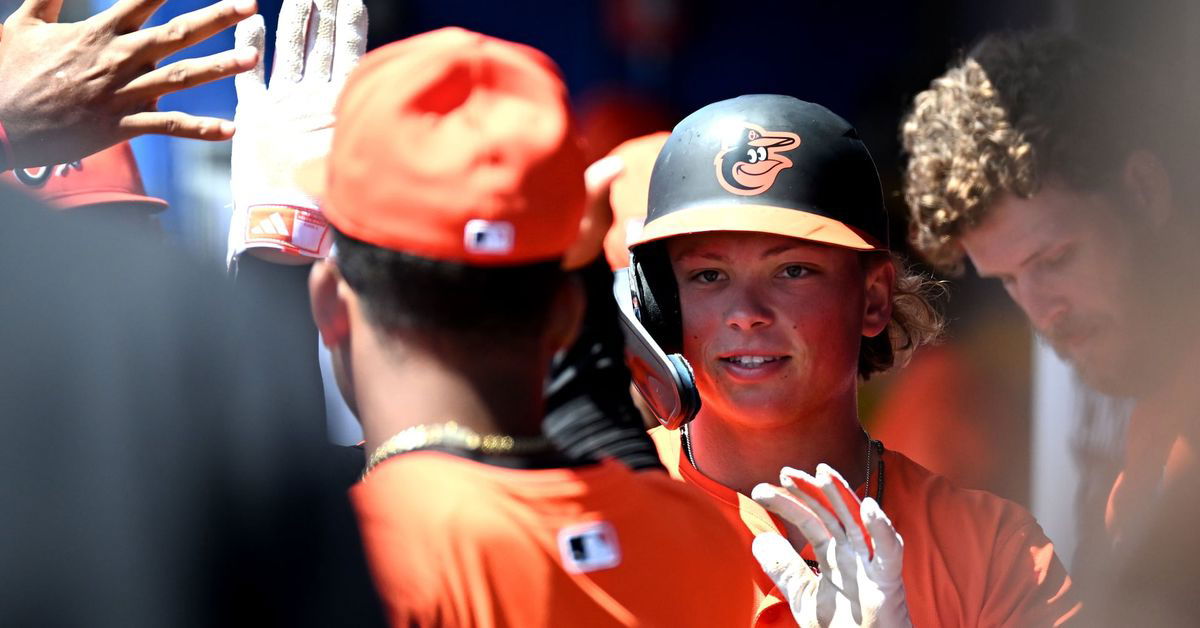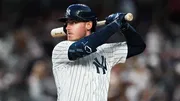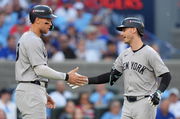

Jackson Holliday. From a high school prospect to the crown jewel of baseball’s future, his name electrifies dugouts and grandstands alike. He’s not just a talent; he’s an event. However, the Baltimore Orioles, known for their recent rise from underdog to contender, sent shockwaves through the baseball world with their decision to send Holliday back to the minors yesterday. The move leaves experts and fans buzzing with a flurry of questions. Was it purely a development decision driven by long-term vision?
Watch What’s Trending Now!
This isn’t a simple story of a promising prospect missing out on a promotion. This is a complex chess match between the immediate desire to win and strategic maneuvering for future control. It’s a debate about whether the risk of delaying Holliday’s arrival outweighs the potential reward of a long and dominant career—the ramifications of which are worth considering.
ADVERTISEMENT
Jackson Holliday: A talent too good to ignore?
It’s easy to understand why there was so much excitement surrounding Holliday. His meteoric rise from a lightly regarded high school prospect to the top of the prospect rankings has been nothing short of astonishing. His first professional season in 2023 was a revelation. Not only did he tear through every minor league level, hitting a combined .323 with a .954 OPS, but he also displayed remarkable plate discipline with an eye-popping 101 walks against 118 strikeouts.
Jackson Holliday's ready for #SpringBreakout! He just CRUSHED a grand slam 💥 pic.twitter.com/Cdbd9MoNAS
— MLB (@MLB) March 10, 2024
Keith Law, The Athletic’s prospect sage, notes, “He(Jackson) has exceptional hand-eye coordination, so even when he’s fooled by a pitch he often manages to make contact with it, even hard contact… I think he’ll hit .280-.300 with strong walk rates and 25-plus homers a year.” That’s not just a star-in-the-making; that’s the blueprint for a perennial MVP-caliber franchise cornerstone.
ADVERTISEMENT
Holliday’s Spring Training performance offered further evidence that he belongs in the majors. Despite facing MLB-caliber pitching—including experienced southpaws like Yusei Kikuchi—Holliday looked in command. He even showcased power, blasting a grand slam that left observers in awe. Many believed he’d not only earned his spot on the Orioles’ Opening Day roster but potentially injected a new dynamic into an already potent lineup.
Top Stories
Blue Jays’ Cody Bellinger Stance Confirmed as Ross Atkins Risks Losing Multiple Players, Deems Insider

Blue Jays Moves to Sabotage Yankees’ Cody Bellinger Plans as Ross Atkins Scrambles to Fix Kyle Tucker Misstep: Insider

Cody Bellinger Loses Yankees Veteran’s Trust as Bronx Nation’s World Series Hopes Thrown Into Chaos

Cody Bellinger’s MLB Future All but Confirmed as Yankees, Mets Lock Horns in Mega Battle, Per Insider

Mariners’ Brendan Donovan Hope Fades Quickly as Chaim Bloom Receives Bitter Reality Check

His father, Matt Holliday, a former MLB All-Star himself, observes: “I really never thought he’d do anything else, to be honest with you. From such a young age, how skilled he was and how much he loved to play and be at the field, I never had to worry about whether they were bored or what they were up to, because they were just playing at the ballpark like kids.”
ADVERTISEMENT
This inborn love for the game and the inherent baseball sense seem to elevate Holliday’s potential even further. In light of this dominance, the question begs an answer: Why send your hottest, most talented prospect back to the minors, right when it seems their skillset can elevate the team to new heights?
The Orioles’ development argument in 769 words
The official explanation from Orioles’ GM Mike Elias focuses on Jackson Holliday’s development. “He’s very, very close… He’s very ahead of schedule. He’s done remarkably well. We couldn’t be more excited about his future. But you’re talking about the development of a player who has the opportunity to be one of the better, if not best, players in the league.”
ADVERTISEMENT
Here is Mike Elias' 769-word response when asked why Jackson Holliday was reassigned to minor league camp: pic.twitter.com/oLzOEDyQqD
— Jacob Calvin Meyer (@jcalvinmeyer) March 22, 2024
Elias envisions a long, productive career for Holliday and believes a few extra weeks or months in the minors will better prepare him for a full-time MLB role. Whereas, the Orioles’ stance on Holliday’s demotion hinges on the concept of meticulous development. Here’s a deeper look at their reasoning, bolstered by insights from industry experts:
Fine-Tuning Skills: While acknowledging Holliday’s dominance, the team highlights areas for refinement. As Keith Law observes, Holliday might benefit from “shortening up his swing sometimes.” The relentless full-count approach that worked wonders in the minors might require adjustments against MLB pitching’s sharper arsenal.
ADVERTISEMENT
Transition to Second Base: Holliday’s natural position is shortstop, but the presence of the talented Gunnar Henderson creates a logjam. The Orioles view him as a capable defender at second, potentially even exceeding Henderson. However, a seamless transition necessitates additional reps and game experience at the new position. As Law himself states, Holliday has “moved around the infield a little,” but solidifying his comfort level at second could be a key factor in the team’s decision.
Building a Strong Foundation: The Orioles, as Elias highlights, pride themselves on developing “elite talents.” Their philosophy seems to be one of controlled advancement, ensuring a player is truly ready for the major league grind, both physically and mentally. Patience, in their view, is key to fostering a long, productive career.
ADVERTISEMENT
Here, it’s important to remember Jackson Holliday’s age. At just 20 years old, he’s still incredibly young for a major leaguer. While his talent is undeniable, the Orioles might be wary of throwing him into the deep end so early. However, this argument feels slightly contradictory.
Holliday dominated minor-league pitching in 2023 and handled himself with ease in the majors this spring. Can the extra time in Triple-A really make that much of a difference when his talent level is so evident? The Orioles risk stunting his growth if he’s overqualified for the level the team desires him to play at right now. This raises another critical question: could Service Time be a hidden factor in this decision?
ADVERTISEMENT
Shades of Service Time manipulation
MLB’s convoluted rules reward teams for delaying a top prospect’s debut by a few weeks, granting them an extra year of control over a player’s career. While Mike Elias adamantly denies this motivation, stating, “No, it’s unfortunate that we have the specter of that to talk about… I think this is about an organization that prides itself in developing elite talents [and] putting a player in the best position for his own long-term success and for the short- and long-term of the team and the roster that he’s on,” the timing and the underlying ambiguity of this decision raise concerns.
20-year-old Jackson Holliday has a chance to make Baltimore's Opening Day roster, but will it be at shortstop?@Orioles GM Mike Elias explains on @MLBNetworkRadio. pic.twitter.com/hV83DOKHcF
— MLB (@MLB) February 7, 2024
Of course, every GM would take this position, as proving the intent to manipulate Service Time is virtually impossible. However, skepticism from fans and analysts is warranted, especially considering the historical precedent for this practice throughout the league. It may also lead others to point out the lack of transparency in the organization’s messaging.
ADVERTISEMENT
As Baltimore Positive observes, “‘He’s not faced a ton of major league quality or even Triple-A quality left-handed pitching,’ said Elias, stating his preference for Holliday to be ready to play every day upon arriving in the majors.”
It seems dubious on the team’s part after repeatedly hinting at the possibility of Holliday cracking the Opening Day roster throughout the offseason. This shift in narrative fuels suspicions that the team is prioritizing long-term control over maximizing Holliday’s immediate impact.
Read More: 2024 MLB Preview: Predictions, Marquee Matchups, Rookies to Watch, and More
The team’s choice clashes with how clubs like the San Diego Padres and the Milwaukee Brewers handled their “Jacksons.” Jackson Merrill (Padres) and Jackson Chourio (Brewers) are both younger prospects than Holliday, but they made their respective Opening Day rosters. Is this a sign of the Orioles being overly cautious? Or does it point to an underlying agenda of prioritizing long-term control in 2030 over short-term competitive gains in 2024?
Are The Birds sacrificing short-term success?
Elias’ attempts to downplay Jackson Holliday’s chances throughout the offseason seem disingenuous in retrospect, further fueling disappointment and accusations of mismanagement. This question becomes even more pressing when we consider the O’s recent success. After their stunning AL East title in 2023, fans expected the team to be all-in for 2024. Yet, sending Holliday down feels at odds with that aggressive mindset. Could his presence have provided the spark needed for a repeat? Is his potential impact being undervalued in favor of a nebulous long-term vision?
Some question if, in pursuit of future control, the team is unnecessarily dampening their winning chances in the present. The Orioles’ recent roster moves make this decision even more perplexing. Players like Kolten Wong, who could be replaced by Holliday, highlight the contrast in talent level.
As Wong himself states, “Dude’s a stud, man. He’s gonna be an incredible player… He’s going to be up very soon. We all know that,” adding the pointed comment, “Sometimes the business aspect, you know how the game gets ran.” Wong’s words hint at the Service Time angle, once again implying that sometimes business factors trump talent.
Kolten Wong on Jackson Holliday:
“Dude’s a stud, man. He’s gonna be an incredible player. Sometimes the business aspect, you know how the game gets ran, so he’s going to be up very soon. We all know that.”
— Jacob Calvin Meyer (@jcalvinmeyer) March 22, 2024
Furthermore, other Orioles members seem genuinely perplexed by the decision. “He looks ready to me. I’m happy for the career that he’s going to have,” says IF Ramón Urías. OF Ryan McKenna, on the other hand, believes that “the way he gets into good positions, just the maturity, how he doesn’t let things get to him,” is enough to get a headstart in the majors, with manager Brandon Hyde adding that “it’s hard to say he doesn’t” belong to the big league. This demonstrates a disconnect between those on the field—who see Holliday’s immediate potential—and the front office’s long-term calculations.
Some argue that if the Orioles stumble early in the season, the pressure to bring Holliday up will only intensify. It begs the question: Was the potential reward of an extra year of control in 2030 worth hindering the team’s chances at back-to-back playoff appearances? The risk is real.
As TSN notes, “Holliday split time between four levels in the minors last season after being selected first overall in the 2022 MLB June Amateur Draft. He hit at every level… The Orioles have an abundance of young, talented infielders… So it’s unclear where Holliday will play when he does get the call up.” This delay risks stifling Holliday’s rapid rise and potentially disrupting team chemistry in a critical year for the Orioles.
A calculated risk with uncertain rewards
The Baltimore Orioles’ decision to demote Jackson Holliday is a complex gamble. On the one hand, the move aligns with the franchise’s reputation for carefully developing young players—a reputation earned through the success of Adley Rutschman and Gunnar Henderson. If Holliday emerges even stronger from his Triple-A stint and contributes significantly to a 2024 playoff run later in the season, the Orioles may well be vindicated. However, this decision carries undeniable risks.
I don’t get it. Jackson Holliday should be coming north. I understand that he could use a little fine tuning but I think that’s something that can be worked on in Baltimore, not Norfolk. A lot of people bought opening day tickets expecting to see him and are now rightfully upset
— Cordell Woodland (@CordellWoodland) March 22, 2024
It sends a mixed message to fans, eager for the team to build on its 2023 success. The potential for Holliday to make a difference right away raises doubts about whether The Birds have fully prioritized their present-day competitiveness. More troubling is the lingering question of Service Time manipulation. Even if Elias is operating honestly, the optics of demoting the most talented prospect while carrying less exciting roster pieces leave room for reasonable suspicion.
The consequences of this choice will reverberate throughout the 2024 season. If Holliday dominates Triple-A and the Orioles flounder, the front office will face immense pressure to reverse course. Moreover, if the team ultimately falls short of repeating as division champs, this missed opportunity will loom large. Ultimately, time will tell if the Orioles’ calculation—prioritizing Holliday’s future over his immediate impact—pays off. Only the team’s performance and Holliday’s eventual ascendance will provide the final answer.
ADVERTISEMENT
ADVERTISEMENT
ADVERTISEMENT